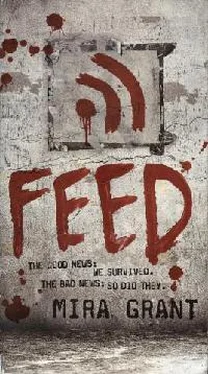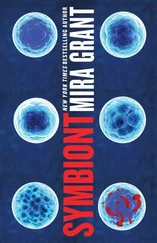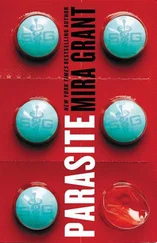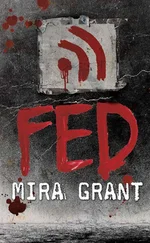The light started flashing green instead of red, continuing to alternate with yellow for a few more seconds before yellow bowed out, leaving green to flash alone. The door unlocked, and the bland voice of the house said, “Welcome, Shaun and Georgia.”
“S’up, the house?” Shaun replied, removing his shoes and tossing them into the outdoor cleaning unit before he walked inside, hollering, “Hey, ’rents! We’re home!” Our parents hate being called “ ’rents.” I’m pretty sure that’s why he does it.
“And we survived!” I added, copying the gesture and following him through the garage door. It swung closed and locked itself behind me. The kitchen smelled like spaghetti sauce and garlic bread.
“Failure to die is always appreciated,” Mom said, entering the kitchen and putting an empty laundry basket on the counter. “You know the drill. Both of you, upstairs, and strip for sterilization.”
“Yes, Mom,” I said, picking up the basket. “Come, Shaun. The insurance bill calls us.”
“Yes, master,” he drawled. Ignoring Mom entirely, he turned and followed me up the stairs.
The house was a duplex before Mom and Dad had it converted back into a single-family home. Our bedrooms literally adjoin; there’s an inside door between them. It makes life easier when it’s time for editing and prep work, and it’s been like that all our lives. On the few occasions when I’ve had to try sleeping without Shaun in the next room, well, let’s just say I can go a long way on a six-pack of Coke.
I dropped the laundry basket in the hallway between our doors before going into my room and flicking the switch to turn on the overheads. We use low-wattage bulbs in the entire house, but I’ve abandoned white light entirely in my private space, preferring to live by the gleam of computer monitors and the comforting nonlight of black-light UV lamps. They can cause premature wrinkling if used extensively; what they can’t do is cause corneal damage, and I appreciate that.
“Shaun! Inside door!”
“Got it,” Shaun called. The connecting door slammed shut, and the band of light beneath it was cut off a second later as he slid the damper into place. Sighing with relief, I removed my sunglasses, forcing my eyes to open all the way. I’d been out in the sun for too long; even the UV lamps stung for a few seconds before my eyes adjusted and the room snapped into the sort of detailed focus most people only get in direct light.
“Retinal Kellis-Amberlee,” as it’s popularly called, is more properly referred to as “Acquired Kellis-Amberlee Optic Neuropathic Reservoir Condition.” I’ve never heard anyone call it that outside a hospital, and even there, it’s usually just “retinal KA.” Those good old reservoir conditions: One more way for the virus to make life more interesting for everybody. My pupils are permanently dilated and don’t contract in response to light, retinal scans are impossible, testing my vitreous and aqueous humors will always register a live infection, and best of all, my condition is advanced enough that my eyes don’t even water. The virus produces a protective film and keeps the eyes from drying out. My tear ducts are atrophied. The only upside? Absolutely stellar low-light vision.
I tossed my sunglasses into the biohazard disposal canister and started across the room. My living space shares a lot of features with the van, including the part where Buffy maintains about ninety percent of the equipment and I understand less than half of it. Flat-screen monitors take up most of the walls, and we moved the group servers into my wardrobe last year when Shaun decided he needed more space for his weapons. Whatever. It’s not like I was using it; I don’t wear anything that actually needs to be hung up. I belong to the Hunter S. Thompson School of Journalistic Fashion: If I have to think about it, I have no business wearing it.
When you get right down to it, about the only similarity between my room and the room of your stereotypical twentysomething woman is the full-length mirror next to the bed. There’s a wall dispenser mounted next to the mirror. I ripped loose a sheet of tear-away plastic and spread it on the floor, stepping onto it as I turned to face my reflection.
Hello, Georgia. Nice to see you’re not dead yet.
Slicking my sweat-soaked hair back from my face, I started studying my clothes for the telltale fluorescence that under the black lights would indicate traces of blood.
Shaun and I operate under Class A-15 blogging licenses: We’re cleared to report on events both inside and outside city limits, although we’re still not permitted to enter any zones with a hazard rating at or above Level 3. The zones start at Level 10, the code for any area with resident mammals of sufficient body mass to undergo Kellis-Amberlee amplification and reanimation. Humans count. Level 9 means those mammals are not entirely kept in confinement. Buffy’s neighborhood is considered a Level 10 hazard zone, which means it’s safe to let your children play outside, except for the part where it would instantly convert the zone to a Level 9. Our house is classified as a Level 7 hazard, possessing free-range mammals of sufficient body mass for full viral amplification, local wildlife capable of carrying blood or other bodily wastes onto the property, insufficiently secured borders, and windows more than a foot and a half in diameter. There’s legislation currently under review that would make it a federal offense to raise any child in a hazard zone above Level 8. I don’t expect it to pass. It frightens me that it exists at all.
It requires an A-10 blogging license to enter a Level 3 hazard zone with any prayer of being allowed to exit it. We can’t get those licenses or anything above until we turn twenty-five and pass a series of government-mandated tests, most of which center on the ability to make accurate headshots with a variety of firearms. That means no Yosemite for at least another two years. I’m fine with that. There’s plenty of news to be found in more populated areas.
Shaun feels different, but he’s an Irwin, and they thrive on wandering blindly into danger. All I’ve ever wanted to be is what I am—a Newsie. I’m happy this way. Danger is a side effect of what I do, not the reason behind it. That doesn’t mean danger throws up its hands and says “oh, sorry, Georgia, I won’t mess with you.” Contamination is always a risk when dealing with zombies, especially when you have the recently infected involved. The older infected are usually too concerned with keeping themselves from dissolving to worry about smearing you with their precious bodily fluids, but new ones are fresh enough to have fluid to spare. They’ll splatter you if they can manage it, and then count on the viral bricks filling their bloodstream to do the hard part for them. It’s not great as a hunting strategy, but as a way of spreading the infection it works better than any uninfected person wants it to.
Not that anyone left in the world is actually uninfected—that’s part of the problem. We call people who have succumbed to viral amplification “the infected,” like it changes the fact that the virus is inside every one of us, patiently waiting for the day it gets invited to take over. The Kellis-Amberlee virus can remain in its dormant state for decades, if not forever; unlike the people it infects, it can wait. One day you’re fine. The next day, your personal stockpile of virus wakes up, and you’re on the road to amplification, the death of the part of you that’s a thinking, feeling human being, and the birth of your zombie future. Calling zombies “the infected” creates an artificial feeling of security, like we can somehow avoid joining them. Well, guess what? We can’t.
Viral amplification primarily occurs under one of two conditions: the initial death of the host causing a disruption of the body’s nervous system and activating the virus already there, or contact with virus that has already switched over from “dormant” to “live.” Hence the real risk of engaging the zombies, because any hand-to-hand conflict is going to result in a minimum casualty rate of sixty percent. Maybe thirty percent of those casualties are going to occur in the actual combat, if you’re talking about people who know what they’re doing. I’ve seen videos of martial arts clubs and idiots with swords going up against the zombies in the Rising, and I’ll be among the first to admit that they’re damned impressive to watch. There’s this amazing contrast between the grace and speed of a healthy person and the shambling slowness of the zombie that just… It’s like seeing poetry come alive. It’s heartbreaking, and it’s sad, and it’s beautiful as hell.
Читать дальше












